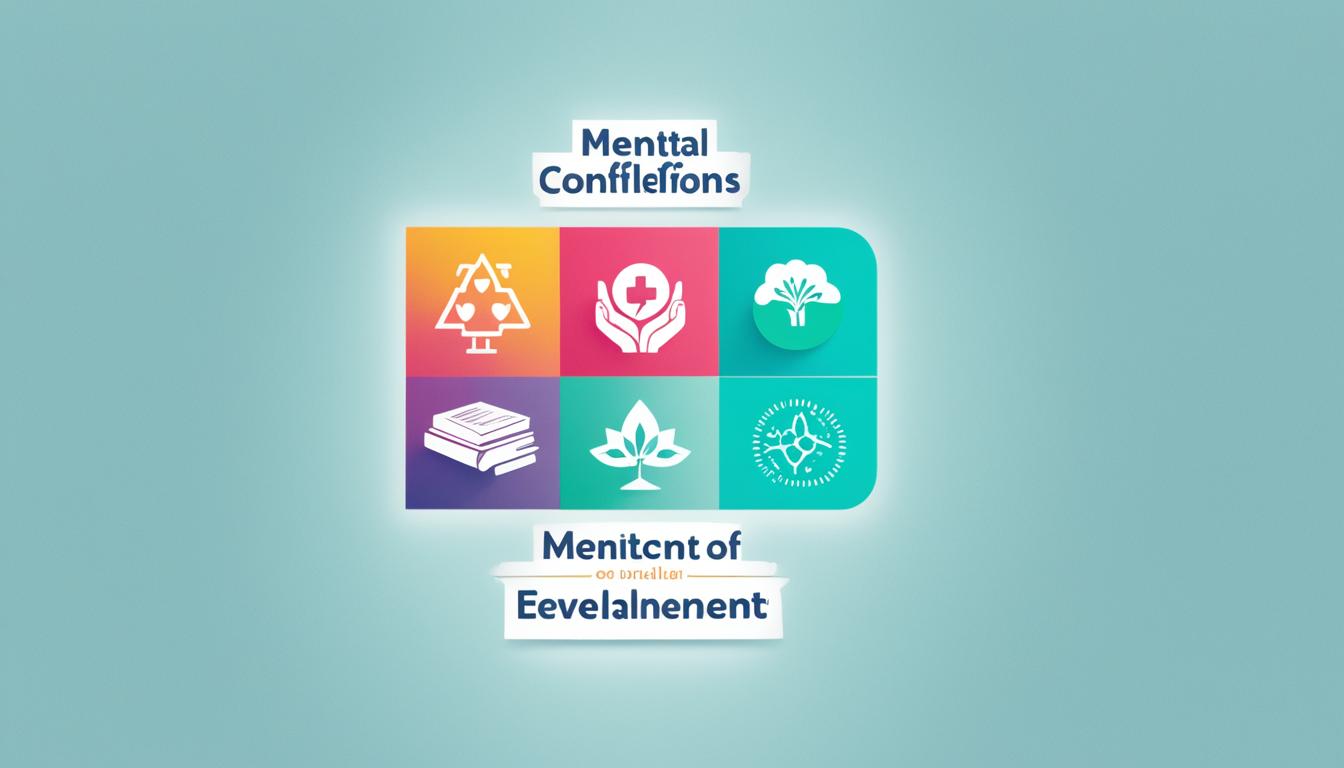A 2022 study found that 76% of employees show signs of a mental health issue. This shows how important it is to teach leaders about mental health at work. Online courses are now key in helping create supportive work places.
In 2018, the UN launched a mental health strategy for its staff. It aims to improve mental health and help staff support mental health efforts. This move has led to more online training that helps leaders manage better and create healthy work environments.
Leadership and mental health courses are becoming more popular in different fields. They teach leaders how to support their teams, reduce stigma, and improve everyone’s well-being.
Key Takeaways
- 76% of employees experience mental health symptoms
- UN Mental Health and Well-being Strategy launched in 2018
- Online courses blend leadership skills with mental health awareness
- Virtual training programs offer flexible learning options
- Self-improvement focus enhances both personal and team well-being
The Importance of Mental Health in Leadership
Leaders are key in making the workplace mentally healthy. They can make a positive work place that makes people more productive and happy.
Creating a Supportive Workplace Environment
A supportive work place means everyone talks openly and cares for each other. Leaders who know how to understand and meet their team’s needs are best at building trust. This lowers stress in the workplace.

The UN Mental Health and Well-being Strategy
The United Nations has a big plan to help staff with mental health issues. This plan is a guide for companies everywhere. It shows how important it is to know about mental health and support each other at work.
Impact on Organizational Success
Leaders who care about mental health make their companies do better. Companies that focus on reducing stress and keeping employees happy often see:
- Increased productivity
- Higher employee retention rates
- Improved team collaboration
- Enhanced company reputation
| Aspect | Impact on Organization |
|---|---|
| Employee Engagement | 25% increase in productivity |
| Absenteeism | 41% reduction in sick days |
| Team Morale | 33% improvement in job satisfaction |
By adding mental health plans to leadership, companies can build a culture that cares for everyone. This leads to success and growth over time.
Online Courses on Leadership and Mental Health
Digital learning platforms have changed how professionals improve their skills. They offer many courses on leadership and mental health. These courses give valuable insights and practical skills.

Now, many online resources focus on mental health awareness and personal well-being. They aim to help leaders create supportive work places. They also teach how to handle mental health issues well.
Some platforms have micro-learning modules. These break down tough topics into easy parts. This makes learning fit into a busy schedule. The lessons use expert videos and stories to keep you interested.
Scenario-based learning is another way these courses teach. It lets people practice their skills in real-life situations. This prepares them for the challenges they’ll face as leaders.
Some courses even offer accreditation. For example, you can get a Level 4 Certificate in Mental Health Aware Leadership. This shows you’re an expert in this important area.
“Leadership is not just about guiding teams to success; it’s about fostering an environment where every individual can thrive mentally and emotionally.”
Using these digital platforms, professionals can learn to lead with empathy. They can also help promote mental well-being in their teams.
Key Objectives of Mental Health Leadership Programs
Mental health leadership programs give managers the skills they need to do well in their jobs. They also help improve employee well-being. These programs aim at several key goals that help leaders and their teams.
Enhancing Personal Well-being
Leaders learn to put their mental health first through resilience-building strategies. They discover stress management, mindfulness, and how to balance work and life. By doing this, they inspire their team to do the same.
Fostering a Supportive Work Environment
Programs show leaders how to build a workplace that’s open and supportive. They learn to spot mental health issues, start conversations, and make policies that make everyone feel safe at work.
Reducing Mental Health Stigma
Leaders learn to tackle wrong beliefs about mental health. They use inclusive language, challenge stereotypes, and encourage understanding. This makes it easier for employees to talk about their mental health.
Developing Support Skills for Colleagues
Programs teach leaders how to help team members with mental health issues. They learn to listen well, offer the right resources, and help get professional help when it’s needed.
By focusing on these goals, mental health leadership programs help managers create healthier, more productive workplaces. These skills are key for the success of the organization and the well-being of employees.
Course Methodologies in Virtual Leadership Training
Virtual leadership training has changed how professionals learn new skills. Digital platforms offer many ways to learn leadership skills. These methods fit different learning styles and schedules, making it easy for everyone to learn.
Self-paced video modules are key in many virtual leadership courses. These short lessons, about 10-15 minutes, let learners learn at their own speed. After watching, learners do reflective activities to use what they learned at work.
Interactive parts are key in virtual leadership training. Forums let learners talk with each other, and portfolio checks track progress. Some courses even have live online sessions where experts meet learners in real-time.
“Virtual leadership training combines flexibility with interactive learning, creating a powerful development experience.”
Virtual leadership training mixes self-study with working together. This mix helps learners build a wide range of skills. It teaches both knowledge and practical leadership skills for today’s digital jobs.
Essential Components of Mental Health Leadership Courses
Mental health leadership courses give managers key skills for a healthy workplace. They mix theory with practical tips for a supportive work setting.
Mental Health Awareness in the Workplace
Leaders learn to spot mental health issues and talk openly about mental well-being. This helps in helping employees early on who are facing mental health problems.
Personal Well-being Strategies
Courses teach leaders how to take care of their mental health. They learn about stress management, mindfulness, and balancing work and life. By focusing on their health, leaders inspire their teams to do the same.
Addressing Mental Health Stigma
Leaders learn to fight wrong beliefs about mental health and build a supportive culture. They learn about mental health issues and encourage talking openly to lessen stigma.
Supporting Colleagues with Mental Health Issues
Courses show leaders how to help team members with mental health problems. They learn to listen well, be empathetic, and know when to refer someone to professional help. This approach builds a culture of caring and emotional smarts at work.
Emotional Intelligence Development for Leaders
Leadership success depends on emotional intelligence. Top self-improvement programs now focus on this key skill. Leaders with high emotional intelligence can handle complex work situations easily.
- Self-awareness
- Self-management
- Social awareness
- Relationship management
Leaders who are good at these skills make positive work environments. They build trust, encourage teamwork, and boost team performance. Many companies now make emotional intelligence a key part of their leadership training.
Cornell University has advanced courses in this area. Professor Allan Filipowicz’s program teaches leaders how to manage their emotions. They learn to understand others and use strategic influence.
| Emotional Intelligence Skill | Benefits for Leaders |
|---|---|
| Self-awareness | Better decision-making, increased confidence |
| Self-management | Improved stress handling, adaptability |
| Social awareness | Enhanced empathy, conflict resolution |
| Relationship management | Stronger team bonds, effective communication |
Investing in emotional intelligence development is smart. Leaders who focus on this skill see better team morale and productivity. They build stronger relationships with colleagues and clients. In today’s fast business world, emotional intelligence gives leaders an edge.
Stress Management Techniques in Leadership Roles
Leaders face unique challenges that can cause stress. It’s crucial for leaders to learn how to manage stress well. This helps them stay well and support their teams. Let’s look at key ways to handle stress in leadership roles.
Identifying Stress Triggers
Leaders must know what causes them stress. Common stressors include tight deadlines, many priorities, and team conflicts. Writing in a stress journal can help find out what causes stress. This lets leaders deal with stress before it gets worse.
Implementing Coping Strategies
After finding out what causes stress, leaders can make plans to cope. These plans might include deep breathing, staying active, or mindfulness. Seeing challenges as chances to grow can also help leaders manage stress well.
Promoting Work-Life Balance
Keeping a good balance between work and life is key to managing stress long-term. Leaders should set clear lines between work and personal time. They should also teach their team to do the same. This helps reduce stress and sets a good example for everyone in the organization.
| Stress Management Technique | Benefits for Leaders | Implementation Tips |
|---|---|---|
| Mindfulness Meditation | Reduces anxiety, improves focus | Start with 5 minutes daily, use guided apps |
| Time Blocking | Enhances productivity, reduces overwhelm | Schedule tasks in focused blocks, include breaks |
| Regular Exercise | Boosts mood, increases energy | Aim for 30 minutes daily, mix cardio and strength |
By using these stress management techniques every day, leaders can become more resilient. They will perform better and make a more positive work place for their teams.
How Can Online Courses on Mental Health and Leadership Complement Inspirational Webinars?
Online courses on mental health and leadership can greatly enhance the experience of inspirational webinars. By offering structured content alongside the dynamic nature of webinars fostering leadership and mental wellness insights, participants gain a deeper understanding and practical tools to implement positive changes in their personal and professional lives.
Building Resilience Through Online Personal Growth Resources
Leaders can improve their resilience with online personal growth tools. These digital tools are full of knowledge and strategies. They help with skills like influencing others and leading teams well.
Many programs focus on mindfulness for leaders. These practices boost mental health and leadership skills. By staying present and focused, leaders can tackle workplace challenges better.
These online resources focus on building resilience. They teach leaders how to recover from setbacks and stay positive. This mental strength is key for success in leadership.
The aim of these resources is to make well-rounded leaders. They learn to motivate their teams and take care of their mental health. This balanced approach leads to more effective and lasting leadership.
FAQ
What is the importance of mental health in leadership roles?
Leaders and managers are key to making a workplace that boosts mental and physical health. They help create an environment that improves employee well-being, productivity, and engagement. This is crucial for the success of an organization.
What is the UN Mental Health and Well-being Strategy?
The UN Mental Health and Well-being Strategy started in 2018. It aims to meet the mental health needs of UN staff. It also boosts their ability to support mental health efforts. The strategy helps staff who face mental health issues.
What are the key objectives of mental health leadership programs?
These programs help leaders use strategies to manage as managers. They improve personal well-being and create supportive work settings. They also reduce stigma around mental health and teach leaders how to support colleagues with mental health issues.
What are the essential components of mental health leadership courses?
Key parts include learning about mental health at work, personal strategies for well-being, and reducing stigma. Advanced courses add topics like leadership, pupil voice, and integrating mental health into teaching.
How do online courses address emotional intelligence development for leaders?
These courses help leaders understand and manage their feelings. They learn to read others and use influence strategically. They offer tools and frameworks for better emotional management and interaction.
What stress management techniques are covered in leadership courses?
Courses teach leaders how to spot stress triggers and cope with them. They focus on work-life balance to boost well-being and productivity at work.
How can online personal growth resources build resilience for leaders?
Online resources help leaders grow personally and build resilience. They cover influence, strategic leadership, and team building. Mindfulness practices are often included to improve mental health and leadership skills.


